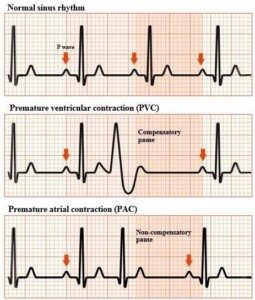Has your teen athlete reported a fluttering or irregular heartbeat from time to time?
Perhaps they’re worried it means heart trouble that could interfere with their sport.
In fact, it’s normal for the parent to be concerned about this.
After all, athletic teens are supposed to have perfectly healthy hearts. Why would they be having skipped or funny beats?
“Premature ventricular contractions (PVCs) occur when there are additional areas in the heart that beat early compared to the ‘normal sinus node,’” says Dr. Pezad Doctor, MD, a pediatric cardiology Fellow with UT Southwestern Medical Center/Children’s Health.
Why would a teenager have a PVC?

YitzhakNat, CC BY-SA 4.0/creativecommons.org
“In teenagers, PVC can occur due to many reasons that include electrolyte imbalance, structural heart disease, cardiomyopathy or underlying cardiac arrhythmias,” explains Dr. Doctor.
“PVC is common in children and teenagers with a normal heart.
“It is usually a benign condition [despite it having many possible causes] and does not affect the heart function or electrical activity of the heart.”
That may seem confusing. It means that the PVC itself won’t affect heart function or its electrical activity, even though in some cases, the PVC is caused by structural heart disease or another heart ailment.
“If they occur frequently or are felt by the child as irregular heart-beating causing discomfort, then they are usually intervened,” says Dr. Doctor.
This harmless but annoying cardiac awareness can be treated with medication or catheter ablation.

Preparing for a cardiac catheter ablation. Navy Medicine, CC BY-SA 4.0/creativecommons.org/licenses
“However, in most cases, there is no underlying cause and is completely benign, causing no harm to the child’s heart.
“It is important to rule out the underlying cause of PVCs, if any, by consulting your medical provider and appropriate investigations.
Under what circumstance would premature ventricular contractions be harmful to a teenager?
“PVC can occasionally be a manifestation of an underlying cardiac disorder such as cardiac arrhythmias, structural heart disease, cardiomyopathy or myocardial ischemia (decreased blood supply to cardiac muscles),” explains Dr. Doctor.
“Hence, additional investigation by a medical provider is necessary to differentiate benign PVC from potentially harmful ones.”
A jumpy, fluttery or “skipped” heartbeat can also be caused by a rush of anxiety or fear, even intense eagerness.
You may want to suggest to your teen to keep a log of when they feel their heart skip a beat or flutter, to see if there’s a common precipitating factor.
If your teen’s PVCs usually occur during or immediately after playing sport or working out, this should be brought up to a pediatric cardiologist.
 Pezad Doctor, MD, is a board certified pediatrician and has published many research studies in general pediatrics and pediatric cardiology on cardiovascular MRI, implantable cardiac devices and pediatric arrhythmias. He strongly believes prevention is better than cure and is passionate about counseling children with congenital heart diseases to lead a healthy lifestyle.
Pezad Doctor, MD, is a board certified pediatrician and has published many research studies in general pediatrics and pediatric cardiology on cardiovascular MRI, implantable cardiac devices and pediatric arrhythmias. He strongly believes prevention is better than cure and is passionate about counseling children with congenital heart diseases to lead a healthy lifestyle.
 Lorra Garrick has been covering medical, fitness and cybersecurity topics for many years, having written thousands of articles for print magazines and websites, including as a ghostwriter. She’s also a former ACE-certified personal trainer.
Lorra Garrick has been covering medical, fitness and cybersecurity topics for many years, having written thousands of articles for print magazines and websites, including as a ghostwriter. She’s also a former ACE-certified personal trainer.
.


























